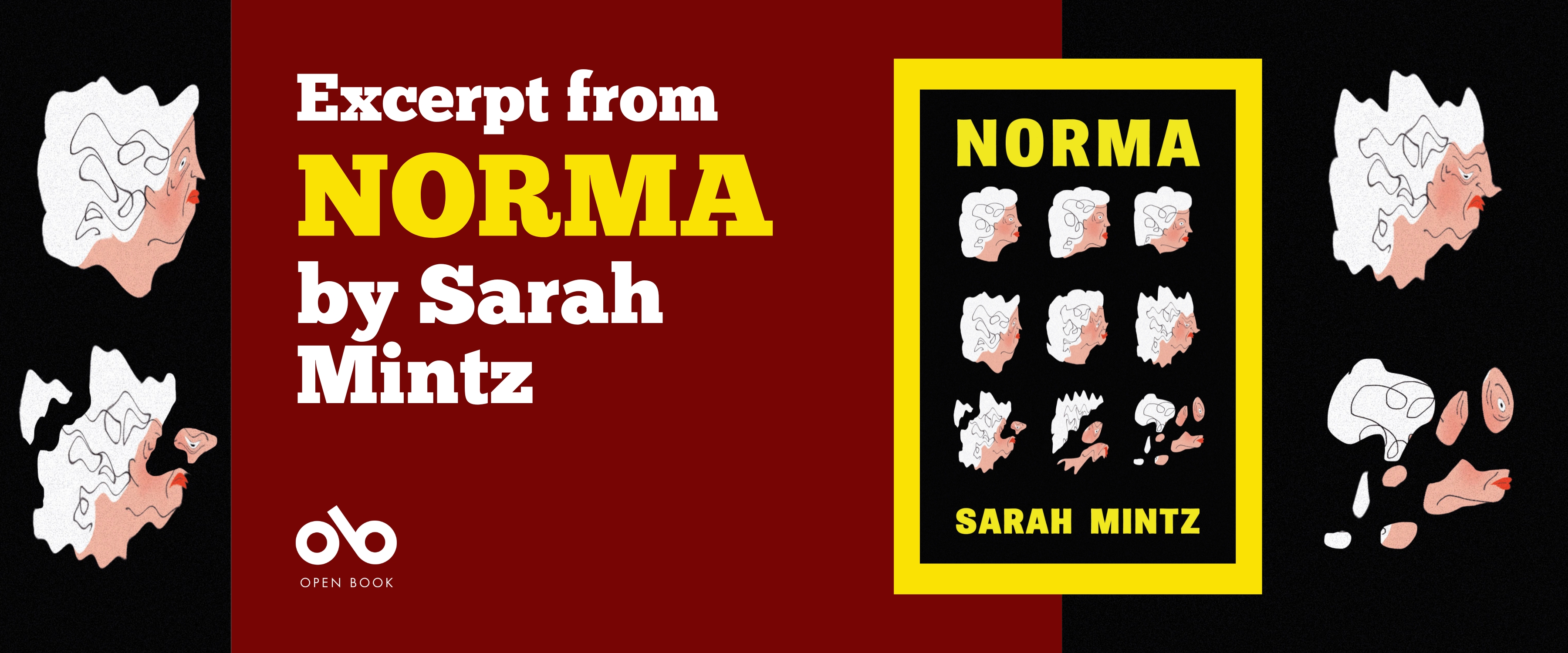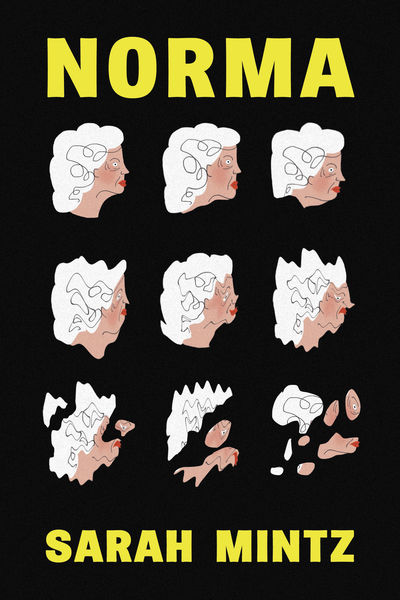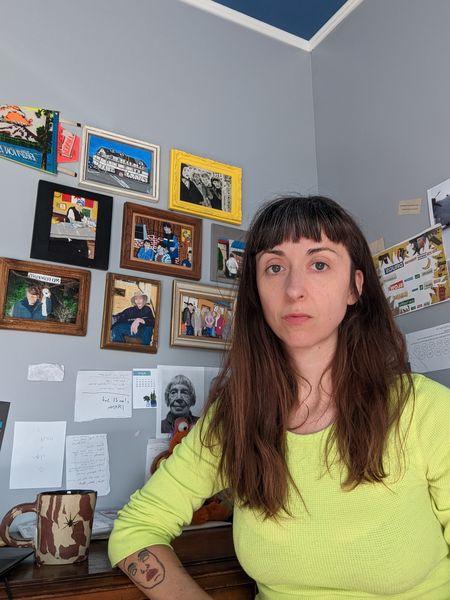Read an Excerpt from NORMA, the New Novel by Sarah Mintz
After decades of marriage and domestic responsibility, Norma has lost her husband and gained a freedom that she perhaps isn't quite prepared to handle. She goes all the way in, delving into some of the weirder parts of the online world and absorbing a messy mix of human behaviour with abandon.
For those of you who like darkly hilarious fiction, with a unique voice and throngs of odd and memorable characters, NORMA (Invisible Publishing) by Sarah Mintz is a novel that will scratch your literary itch. It's an enthralling, wild novel from an author and press that love to push boundaries and challenge readers.
Take a gander at this excerpt from NORMA, which we're excited to share right now on Open Book:
Excerpt from NORMA, the new novel by Sarah Mintz:
Inside the grocery store, everything is tidy and colourful. Sometimes there are sales, and I like to imagine the money I could save if I was in the market for a bag of mixed seafood or a trio of hot sauces. The store nearest my house, the Savery, is where, if I had to pick a point, I’d point there, and more to the point, as the moment I met Marigold.
I’m familiar with the Ujang Feeling files. A Skontac worker, he mainly submits police recordings, and having “favourited” Feeling and being a preferred user for the time I’ve devoted to the DERG org, I get early pick of the files. They come up neat in rows and columns, arranged by preferences: favourited users, sorted further by accent, subject matter, quality, length of file, and number of speakers. The Feeling files are somewhat rare, or else there are users more preferred than me, with even more time to stare at the screen—watching at night, perhaps, during breakfast, lunch, dinner, mid-afternoon snacks, late-night snacks—sitting at their computers, filling the keyboards with crumbs, making the screens sticky with soda—maybe those users more extreme than me snatch them up, those highly prized Feeling files. Most of the Verve files are so common and terrible as to go unclaimed for hours, whereas the Skontac files, the majority of which are submitted by Ujang Feeling, move quickly for all their sordidness and quality recording.
Could be a common curiosity among preferred transcribers to find intrigue in various states of the carceral system, as found in the Feeling files. We’re getting statements. We’re hearing the story. Though the time a pregnant Hoa told the cop that Dinh was trying to get her to abort her baby and she’d spent the evening in a hotel with Dinh texting his wife and exposing the lies, only for Dinh to empty her purse, steal her car, and brandish a gun at the concierge for no reason anyone could determine—that’s the time I thought, Why? What do I need with these Skontac Feeling files? Maniacs dumping their belongings on the street. Is that who I want to be? Not me. And since I must entertain every encounter as though it’s me living each scene—in the parking lot, in the hotel with Dinh, on the phone with Dinh’s wife—I feel no urgency toward the Feeling files. Though I claim them often, out of some hometown possessiveness, I suppose. Or because I feel knowing and skilled and blessed to come upon the gift of local gossip. And the Dinh file was easy enough, but the content was repetitive even for its sensation. Cheap and fusty. Dirt under the nails, lint and hair stuck to the pant leg. While the sleeping Heshy managed charm like magic.
But the Feeling file that’s led me to linger in a familiar grocery store, use each checkout one at a time, meet each cashier, hover over meats, sniff the fish, eyeball the plastic hats, finger the flowers, ask questions about dirt quality, and nurture a new interest in breads, in cakes—is a gift. From me to me. This reward being even greater than that of finding a quality file from Verve’s Harvinder—though each reward offers jolts of movement, motion, removed from whatever process one assumes made way for the jolt itself. What lizard lobster chimp would puzzle over me with this new prize, when I seek out the Deleanor family online and find that those with profiles keep high privacies, but one of them has been tagged in a photo of a company softball team at the Savery’s employee picnic.
*
She isn’t a real cashier, I suppose; she just stands by the self-checkout counters in case anyone needs help. Or in case someone is trying to steal. I assume. Actually, I don’t know if her role is to prevent theft or really why she stands there, as I tend to think her twinkling blue-violet eyes would offer more encouragement than discouragement to would-be thieves.
The girl stands, leans, on the side of an employee podium. Doris, known only by her name tag, approaches: “How are ya, hon?” The young girl’s arms are crossed over her chest, over her name tag, but she’s what I expected, what I would’ve expected had I known how to say I expected it when I found the fuzzy picture online. She’s slight and delicate, with wispy blond hair and painfully thin translucent skin. She sighs, “It’s just a lot. Dealing with this.” Doris purses her lips sympathetically.
Your CanLit News
Subscribe to Open Book’s newsletter to get local book events, literary content, writing tips, and more in your inbox
Before the Deleanor file and the softball search, I wouldn’t have thought to sit around the grocery store. I like to walk there, walk around, look at the deals, and emerge refreshed, or at least emerge. Leave, I mean. I like to walk around, and then I like to leave and then sometimes visit another grocery store and make a day of finding deals and maybe or maybe not buying deals. But I’m caught up in something now; I have to follow through on coincidence made meaningful by ads recommending Skontac after having found Verve when searching for local deposits of obscure information, like a police scanner man wearing a sweaty mesh baseball hat in a shack in his mother’s backyard, but me, with my hunched shoulders in a taffy-coloured kitchen in my dead husband’s house.
Is this why the young girl shifting her weight back and forth, leaning on the podium, standing up straight, folding her arms, dropping her arms, turning, swaying amidst six self-checkout counters has become interesting? Or has she always been interesting? I’ve seen her before; I’m sure I have. I imagine now how my thoughts were then, when I must’ve seen her, and how she was then, before I knew anything about her, when I’d just come to buy groceries to eat groceries like normal. I think she was always interesting because she was young and pretty and had this way or witchery that sometimes certain young people have, capturing, inadvertently, an essential art—art by accident? They just get to be beautiful nature for a day or for a month or for a year or ten—it doesn’t last. It’s always temporary—youth is beauty, youth as beauty—though what could I know about charm and beauty, nature and art?
So I don’t want the girl; I don’t want to pursue her, or have her, or do what people do with beauty, whyever it exists as a girl who works in a grocery store. For breeding, for babies—how do you say it? How do you make sense of beauty? God-given, nature given, you can only make it ugly. Use it up. I’m not beautiful. And I’m not a breeder. Hank and I never had children. It wasn’t discussed, we didn’t bother, it never occurred. Besides, there wasn’t much to us in bed. Body like a dull slab. I did the dishes, I did the laundry, et cetera. Whatever should have come of it didn’t come of it. So nothing of it. Anyhow, I don’t care one way or another about the girl’s beauty, other than to note that it’s there. That’s the strange thing. It’s just there, and you can have ideas about it, but you can’t really explain it.
So I’m LOOKING at the girl. LOOKING at the girl. Youth. No blisters, no bruises, no errant hairs, warts, veins, vessels, flaps—not pieced together, poured whole. LOOKING like something makes sense. In spite of godless happenstance, a flower blooms to shame the weeds. But so, one plant’s as good as another, in the right system, in a botanist’s garden—but no. Stop pretending. In a forest full of orchids, animals step softly; in a bramble of Scotch broom, thrash and burn. Don’t pretend. Stop pretending. It hurts, it aches, it’s not for you, it’s not for anybody—just an animal whose accident mimics hope, promises purity, transcends.
Everyone looks at her; everyone talks to her. She smiles demurely and bows her head, a little embarrassed. I know I know her. I know I’ve seen her. Coming across her father’s Feeling file and the tagged shot at a company picnic—it isn’t nothing fueling that. Doris just offers an in, and I take a seat. The small section beside the self-checkout counters is where a person sits with a coffee or with their heat-lamp-warmed chicken or a plastic tray of day-old sushi. And while I sit with a foam cup full of decent coffee—not bad anyway, tastes fine to me—listening to Doris talk to a familiar forlorn girl who has dropped her arms and angled her body in a way that I can see the tag on her chest, I am beyond convinced; I know it for sure: I’ve found the girl from the file, the girl from the internet.
________________________________________________
Excerpted from NORMA by Sarah Mintz, copyright 2024. Reproduced with permission of Invisible Publishing.
Sarah Mintz is a graduate of the English MA program at the University of Regina. Her work has been published with Book*Hug Press, JackPine Press, Apocalypse Confidential, The Sea & Cedar Literary Magazine, and Agnes and True. Her flash fiction collection handwringers was published with Radiant Press. NORMA is her debut novel. Find out more at https://smintz.carrd.co.






